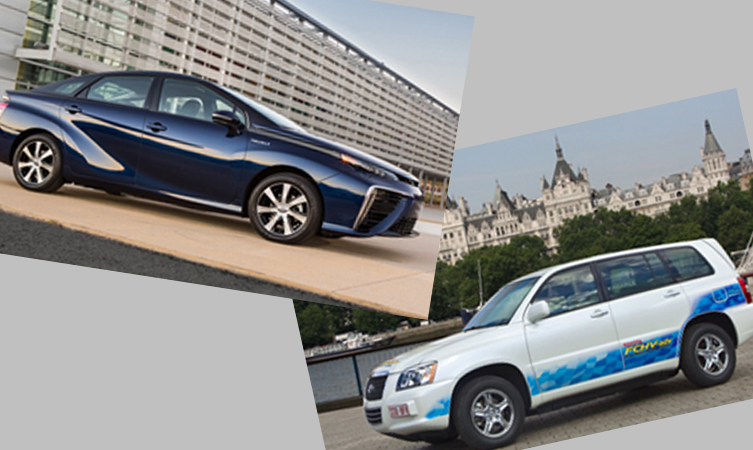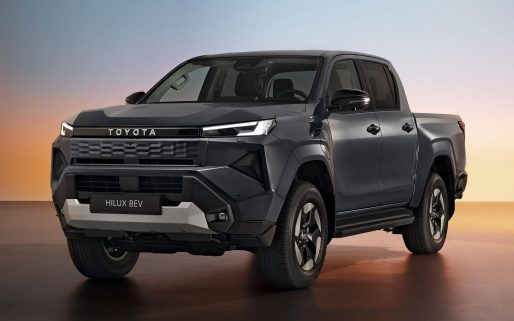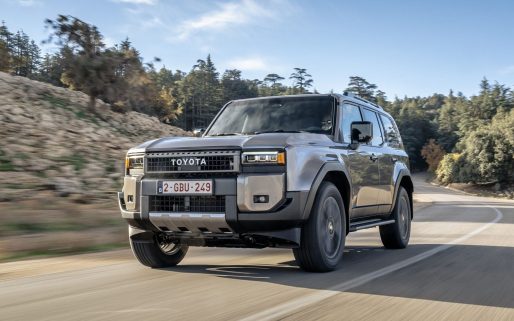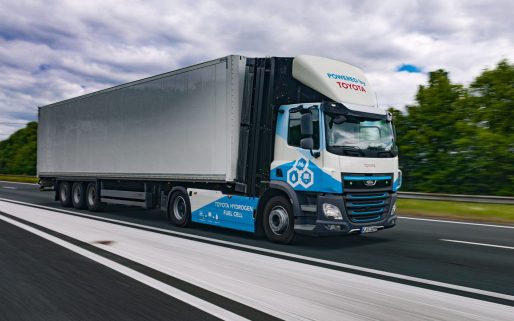
We take a look at the technical specifications for the Toyota Mirai with comparative values for the previous SUV-based FCHV-adv fuel cell vehicle. Toyota previously made FCHV-adv available in very limited numbers as a lease vehicle.
| FUEL CELL STACK | TOYOTA MIRAI | TOYOTA FCHV-adv | |
| Type | Polymer electrolyte fuel cell | Polymer electrolyte fuel cell | |
| Humidification system | Internal circulation | External humidifier | |
| Max. output (bhp/kW) | 153/114 | 121/90 | |
| Volume-power density (kW/l) | 3.1 | 1.4 | |
| Mass-power density (kW/kg) | 2.0 | 0.83 | |
| Volume (l) | 37 | 64 | |
| Weight (kg) | 56 (cells + fastener) | 108 | |
| Cells | Number in one stack | 370 (single line stacking) | 400 (dual line stacking) |
| Thickness (mm) | 1.34 | 1.68 | |
| Weight (g) | 102 | 166 | |
| Flow channel | 3D fine mesh | Straight channel | |
| Separator material | Titanium | Stainless steel | |
| MOTOR | |||
| Type | AC synchronous electric generator | AC synchronous electric generator | |
| Max. output (bhp/kW) | 152/113 | 121/90 | |
| Max. torque (Nm) | 335 | 260 | |
| HIGH-PRESSURE HYDROGEN TANKS | |||
| Number of tanks | 2 | 4 | |
| Type | Type 4 | Type 4 | |
| Structure | 3-layer | – | |
| Materials | Inner layer – plasticMiddle layer – carbon fibre-reinforced plasticSurface layer – plastic | – | |
| Fuel | Compressed hydrogen | Compressed hydrogen | |
| Max. filling pressure (MPa) | 87.5 | 70 | |
| Nominal working pressure (MPa) | 70 | – | |
| Storage density (wt%) | 5.7 | 4.7 | |
| Total internal volume (l) | 122.4 (60 front, 62.4 rear) | 156 | |
| Hydrogen storage mass (kg) | Approx. 5.0 | – | |
| Combined tank weight (kg, not including valve) | 87.5 | – | |
| Refuelling time (min)3 | Approx. 3 | – | |
| BATTERY | |||
| Type | Nickel-metal hydride | Nickel-metal hydride | |
| FUEL CELL BOOST CONVERTER | |||
| Number of phases | 4 | – | |
| Max. output voltage (V) | 650 | – | |
| Volume (l) | 13 | – | |
| PERFORMANCE | |||
| Cruising range (miles – approx.. figure prior to homologation) | 300 | – | |
| Fuel consumption | Tba | – | |
| Max. speed (mph) | 111 | 96 | |
| Acceleration 0-62mph (sec) | 9.6 | – | |
| Acceleration 25-44mph (sec) | 3.0 | – | |
| Cold start temperature tolerance (deg C) | -30 | -30 | |
| DIMENSIONS AND WEIGHTS | |||
| Length (mm) | 4,890 | 4,735 | |
| Width (mm) | 1,815 | 1,815 | |
| Height (mm) | 1,535 | 1,685 | |
| Wheelbase (mm) | 2,780 | – | |
| Track – front (mm) | 1,535 | – | |
| Track – rear (mm) | 1,545 | – | |
| Min. ground clearance (mm) | 130 | – | |
| Interior length (mm) | 2.040 | – | |
| Interior width (mm) | 1,465 | – | |
| Interior height (mm) | 1,185 | – | |
| Seats | 4 | 5 | |
| Kerb weight (kg) | 1,850 | 1,880 | |
| Coefficient of drag (Cd) | 0.29 | – | |
Click the following links to find out more about the Toyota Mirai.
Toyota Mirai fuel cell car: technical specs and release date
Toyota Mirai: Environmental performance and convenience
Toyota Mirai: Designed and equipped for safety
Toyota Mirai: Exterior and interior design
Toyota Mirai: Handling stability and outstanding quietness
Toyota Mirai: The future has arrived





nice.